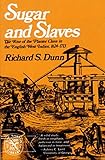Sugar and slaves : the rise of the planter class in the English West Indies, 1624-1713 / by Richard S. Dunn
Material type: TextLanguage: English Series: Norton library ; N692.New York : Norton, 1973©1972 Edition: First publishedDescription: xx, 359 pages : illustrations ; 20 cmContent type: text Media type: unmediated Carrier type: volumeISBN: 0393006921 (paperback)Other title: The rise of the planter class in the English West Indies, 1624-1713Subject(s): Sugar -- Manufacture and refining -- West Indies, British | West Indies, British -- Social life and customs | West Indies -- History -- 17th centuryLOC classification: F2131 .D8 1973
TextLanguage: English Series: Norton library ; N692.New York : Norton, 1973©1972 Edition: First publishedDescription: xx, 359 pages : illustrations ; 20 cmContent type: text Media type: unmediated Carrier type: volumeISBN: 0393006921 (paperback)Other title: The rise of the planter class in the English West Indies, 1624-1713Subject(s): Sugar -- Manufacture and refining -- West Indies, British | West Indies, British -- Social life and customs | West Indies -- History -- 17th centuryLOC classification: F2131 .D8 1973| Item type | Current library | Shelving location | Call number | Copy number | Status | Notes | Date due | Barcode |
|---|---|---|---|---|---|---|---|---|
| Books | MEF Üniversitesi Kütüphanesi | Genel Koleksiyon | F 2131 .D8 1973 (Browse shelf (Opens below)) | Available | Bağışlayan: Bağış sahibi bilinmiyor | 0006358 |
"Published for the Institute of Early American History and Culture at Williamsburg, Virginia."
Includes bibliographical references.
1. Beyond the line -- 2. Barbados : the rise of the planter class -- 3. Barbados : the planters in power -- 4.The Leeward islands -- 5. Jamaica -- 6. Sugar -- 7. Slaves-- 8. Life in the tropics -- 9. Death in the tropics -- 10. The legacy
First published by UNC Press in 1972, Sugar and Slaves presents a vivid portrait of English life in the Caribbean more than three centuries ago. Using a host of contemporary primary sources, Richard Dunn traces the development of plantation slave society in the region. He examines sugar production techniques, the vicious character of the slave trade, the problems of adapting English ways to the tropics, and the appalling mortality rates for both blacks and whites that made these colonies the richest, but in human terms the least successful, in English America. "A masterly analysis of the Caribbean plantation slave society, its lifestyles, ethnic relations, afflictions, and peculiarities.--Journal of Modern History "A remarkable account of the rise of the planter class in the West Indies. . . . Dunn's [work] is rich social history, based on factual data brought to life by his use of contemporary narrative accounts.--New York Review of Books "A study of major importance. . . . Dunn not only provides the most solid and precise account ever written of the social development of the British West Indies down to 1713, he also challenges some traditional historical cliches.--American Historical Review
